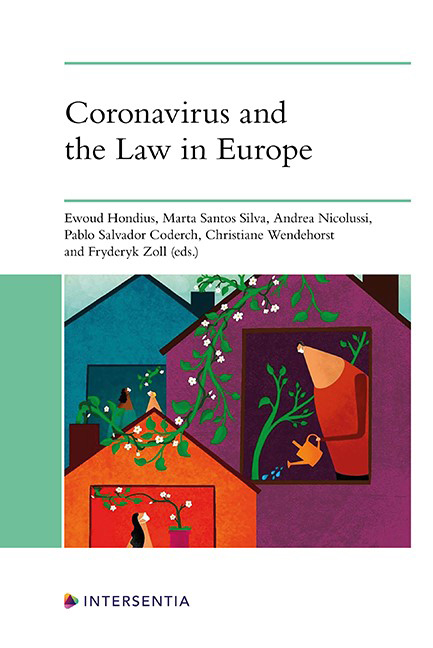Book contents
- Frontmatter
- Preface
- Contents
- List of Keywords
- List of Contributors
- PART I COVID-19 AND FUNDAMENTAL RIGHTS
- PART II STATES AGAINST THE PANDEMIC
- PART III COMPENSATION FOR COVID-19 RELATED DAMAGE
- PART IV CONTRACT LAW
- PART V CONSUMER LAW
- PART VI LABOUR AND SOCIAL LAW
- PART VII CORONAVIRUS CHANGING EUROPE
- Epilogue
- Annex: ELI Principles for the COVID-19 Crisis
- About the Editors
Preface
Published online by Cambridge University Press: 10 December 2021
- Frontmatter
- Preface
- Contents
- List of Keywords
- List of Contributors
- PART I COVID-19 AND FUNDAMENTAL RIGHTS
- PART II STATES AGAINST THE PANDEMIC
- PART III COMPENSATION FOR COVID-19 RELATED DAMAGE
- PART IV CONTRACT LAW
- PART V CONSUMER LAW
- PART VI LABOUR AND SOCIAL LAW
- PART VII CORONAVIRUS CHANGING EUROPE
- Epilogue
- Annex: ELI Principles for the COVID-19 Crisis
- About the Editors
Summary
In January 2020, a pandemic broke out. It brought death and havoc, and commercial and economic links were cut off. This coronavirus epidemic immediately became the subject of scientific research. How to find a vaccine to cure COVID-19? How to alleviate pain and suffering? But it was not only medical and pure scientific matters which were considered. Economic and ethical issues were explored as well, as were legal problems. This volume purports to explore the latter. The coronavirus has already led to a number of national publications from Belgium, the Netherlands, Switzerland, the US, and other jurisdictions. A pan-European approach, or even a global focus, is quite evident. The current book enlists contributions from various European nations. The authors have mainly, but not exclusively, been selected from a group of scholars who, in the past, were engaged in European projects such as the DraftCommon Frame of Reference and who still are in touch over issues such as Brexit.
I am very grateful to these authors, who have been so kind as to adhere to a very strict time limit, the idea being that in order to have any effect, a book should be on the market as soon as possible.
My gratitude also goes to the five eminent jurists who have been willing to take on the editorship of the volume. Travel restrictions brought about by the coronavirus made a high-tech approach with MicrosoftTeams and Zoom necessary. So, Marta Santos Silva, Andrea Nicolussi, Pablo Salvador Coderch, Christiane Wendehorst and Fryderyk Zoll, thank you so much.
We also wish to thank our publisher, Intersentia, for their cooperation. All contributions reflect the latest in COVID-19 emergency legislation as of at least July 2020.
- Type
- Chapter
- Information
- Coronavirus and the Law in Europe , pp. v - viPublisher: IntersentiaPrint publication year: 2021



